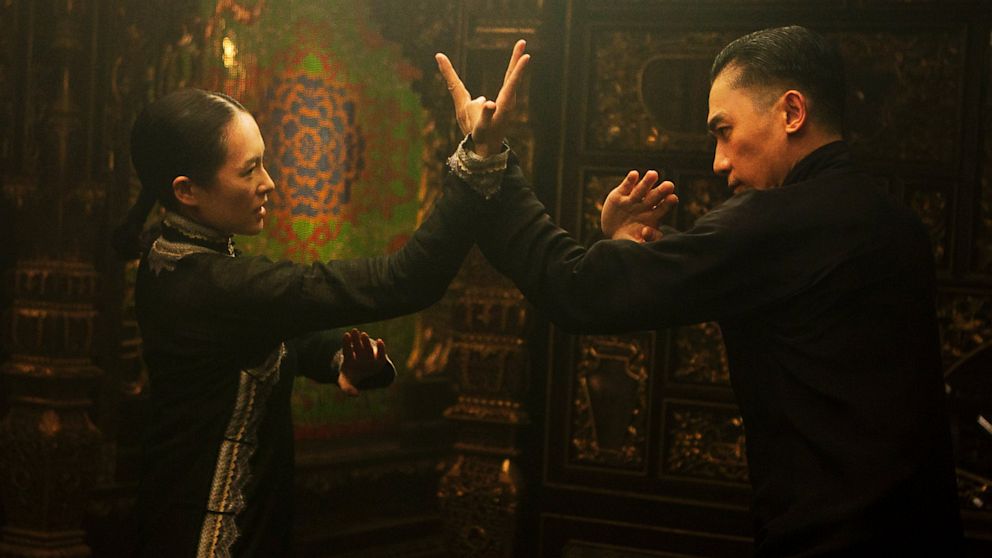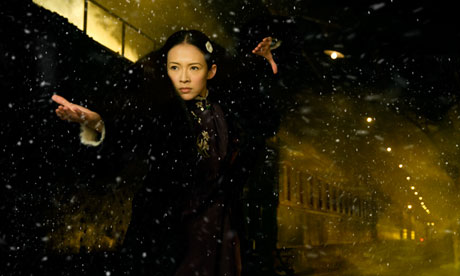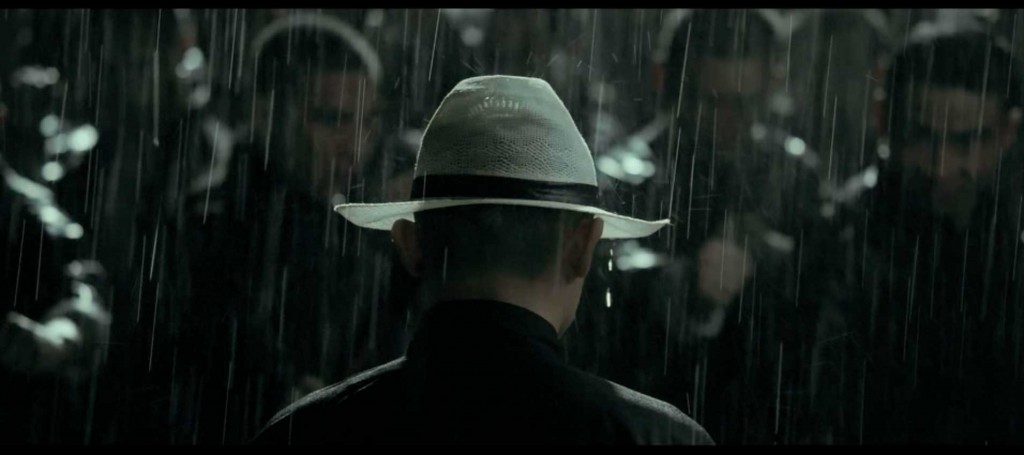To those unfamiliar with the work of Chinese filmmaker Wong Kar-wai, the American TV spots for The Grandmaster must have seemed pretty run of the mill. Harvey “Scissorhands” Weinstein, who notoriously cut twenty two minutes from the international cut of the film, managed to convince US audiences that they were in store for a thrilling and action packed genre pastiche aimed squarely at twentysomethings and casual aficionados of Asian people kicking one another in the face. The whole marketing campaign seemed borrowed: the anachronistic use of hip-hop music and digital swaths of blood in the titles on loan from RZA’s The Man With The Iron Fist, the expertly packaged glimpses of beautifully choreographed Yuen Woo Ping fights resembled every American ad for a Tony Jaa movie. While it must have frustrated some, Kar-wai managed to craft something much more interesting and emotionally affecting, even with his hands tied behind his back by the realities of Western film distribution.
The Grandmaster is a kung fu movie that follows Ip Man, the legendary practitioner of Wing Chun, a martial art famously popularized by one of his greatest students, Bruce Lee. We follow Ip Man (the reliably great Tony Leung) from the early 1930s through the mid-1950s. Ip Man lives in small Foshan, practicing martial arts and enjoying what one could consider an upper middle class lifestyle with his wife and children, until the Second Sino-Japanese War plunges them into poverty and hunger, leading Ip Man to Hong Kong to support them. He ends up exiled there, running into Gong Er, the daughter of a grandmaster he famously defeated earlier in life, an apt unrequited love interest deftly played by Zhang Ziyi.
The film finds a sweet spot between historical fiction, classical kung fu film tropes, and the sort of sweeping depiction of unrequited love Wong Kar-wai has made his name creating. Outside of the epic wuxia film Ashes of Time, many of Kar-wai’s works focus on small tales of love, lust, and infatuation. He takes a situation that may seem relatively minor, like the dejected cop in Chungking Express who can’t seem to get over his ex, or the cuckolded neighbors who find one another in In The Mood For Love, and transforms their little slices of life into exquisite, extravagant 7 Layer German Chocolate Cake melodrama. The chief criticism of Kar-wai’s films is that nothing happens in them, which is a cheap observation. As a storyteller, he is considerably less interested in plot and character dynamics as he is giving life to inexpressible emotions or capturing an intangible mood through sumptuous photography, casually manipulative film editing and the hypnotically repetitive use of music. More “happens” in one moment of Kar-wai’s protagonists longingly gazing at one another than in any two hours of a densely scripted, plot-driven David Mamet film.
Kar-wai is not without fault. This lackadaisical approach to structure does lead to films like 2046, a beautiful two and a half hour film that feels roughly six weeks long, or My Blueberry Nights, his sole English language feature that takes meandering navel gazing to heretofore unexplored heights of ennui. In the US Theatrical Cut, much of the missing half hour from the original version of the film is thought to be more needless Kar-wai flourish. I imagine Harvey sat behind him in the editing room and screamed “CUT!” every time someone was gazing out of a window for more than ten seconds of screen time. What remains is a tighter, more focused film that largely accomplishes what Kar-wai set out to do. It maintains a curious structure not unlike that of your average porno film. One can easily picture action fans fast forwarding through the introspective voice-over narration and long shots in the snow to get to all the face kicking.
Oh, right. ALL OF THE KICKING. Yuen Woo Ping handles the fight choreography, as he did on all the Matrix films and countless other movies, but here, his wire work and balletic movements seem to fit. I’ve always felt his fights looked more like dances than, you know, two people trying to hurt one another, but in the poetic space this film occupies, where two individuals are communicating their emotions, their philosophies and their heritages through hand to hand combat, his particular style is perfectly appropriate. The opening “One vs Many” brawl in the rain that is seen in most of the trailers sets you up for the inevitable “art house director can’t do action” criticisms faster than you can say “Christopher Nolan” with it’s incoherent editing and reliance on poorly framed close-ups. Luckily, every subsequent set piece is so carefully and stunningly realized that you’ll pretty much forget that opening salvo entirely.
You don’t just get punches, kicks, dodges and blocks. You see Ip carefully study his various opponents’ fighting styles and see how the comparatively basic moves of Wing Chung best them. Every fight is about something. None of the action interludes are without some greater thematic heft. Much the way characters break into song during musicals to further the story on a higher plane of expression, so do the combatants in The Grandmaster, when they let their feet and fists do the talking. Kar-wai chooses the best moments and images to highlight. In a later fight, when a supporting character takes on countless henchmen with a sword in the snow, other filmmakers might paint in broad strokes, slathering blood over every inch of the frame. Instead, he shows wisps of cotton from the stabbed men’s coats flowing in the air, ripped from their garments by a blade. In that same sequence, on a train platform, when Gong Er fights the living personification of male oppression in the martial arts for her family’s honor, a moving train thrusts behind the two fighters, moving across the frame in her direction, the propulsive inevitability of the locomotive underscoring everything that is at stake.
Another standout sequence comes in the banquet after Ip Man defeats Gong Er’s father, retiring grandmaster Gong Yutian, in a passing-of-the-torch exhibition match. As is tradition, the winner, Ip, must host a reception, and it is here that he and Gong Er first meet. She sets out to restore her father’s honor and ends up besting Ip Man. It is the only time in the narrative we see him lose, and the fight is shot as the ultimate Meet Cute, at first, an exploratory ball dance, and then an exuberant display of foreplay, followed by a premature climax, after which we spend the rest of the film gagging for a rematch.
Ultimately, it’s a kung fu film about wit and cunning and life and art and love. The focus is on the relationships between these characters, and the historical fiction element serves merely as a backdrop. In this cut of the film, those character moments are given so little time, but the performers create multitudes with what little they are given. Song Hye-kyo, who plays Ip Man’s wife, has no lines of dialogue, but manages to convey so much fear and trepidation during the shooting of a family portrait at her husband’s growing distance and obvious infatuation with Gong Er. Similarly, Kar Wai is able to imbue inanimate objects with such emotional power, from the coat button that represents the path Ip never got to take, to the frenetic passion displayed in Ip’s calligraphy in his letters to Gong.
Of all of Kar-wai’s familiar tricks, the most absent is his use of popular music. The same man who turned Nat King Cole’s “Quizas, Quizas, Quizas” into a pained refrain in In The Mood For Love, and turned Otis Redding’s “Try A Little Tenderness” into one alcoholic’s torch song in My Blueberry Nights (to say nothing of his use of “All The Leaves Are Brown” in Chungking Express) is content here to rely on the uneven, but serviceable original score provided by Shigeru Umebayashi and Nathaniel Mechaly. There are some classical opera songs sung in a few of the brothel scenes that function in much the same way, but I imagine the choice to rely more on a traditional score was to keep in line with the classical and mythological feel of the early tone of the film.
Tony Leung relies on his natural charisma to give life to a protagonist who seems impenetrable personality wise. His Ip Man is clever and wise and humble in a way that makes him endearing to a fault. You like him so much that you fail to question the expedience with which the film moves on from the loss of his family. You just sort of accept that there must be more going on internally with the character, because it fits with the archetype Leung generally portrays. This is similar to the way Hitchcock used Jimmy Stewart in Vertigo and Rear Window, and it wouldn’t be the first time Kar-wai has used this line of casting thought with Leung, as In The Mood For Love depends equally on Leung’s ability to neutralize your desire to question his character’s actions and motivations by being so irresistibly watchable.
Overall, I really enjoyed the film. The action scenes are some of the most beautifully shot in years and Kar-wai has managed to make a palatable genre film without having to abandon his personal artistic obsessions or heavily dilute his vision. Your mileage may vary, especially if you feel, rightly so, that you were tricked into watching an art house movie when you really would’ve preferred something like The Raid: Redemption.
To me, the beauty of The Grandmaster lies not in any of its expert portraits of martial arts, but in one particular exchange of dialogue.
Kar-wai films tend to be light on banter, and when characters do talk, they sound less like real life people and more like students in a poetry workshop, offering one another platitudes disguised as rough drafts. This style is often employed in foreign films, and functions so much better when not spoken in your own language, because the clunky irregularity of the speech patterns is masked by the romantic mystery of a foreign tongue. For a perfect example of how poorly executed this can be, watch My Blueberry Nights and listen to Jude Law and Norah Jones awkwardly talk at each other with every daydreamed musing and caustic piece of half-wisdom they can muster. Here in The Grandmaster, lies a truly moving line.
Late in the film, Ip Man and Gong Er are having tea together in what will most likely be their last meeting, as Gong is slowly losing herself to opium. She begins to muse that she should’ve been an opera singer, and wonders aloud how different their lives could have been, had they met at a concert, she on the stage and he in the audience. Ip asks her, “What if the show were sold out?” Spoken by any other actor in any other film, this would sound like a casual dismissal, a commentary on the flexible nature of fate. If there were no seats in this theoretical theater, they would never have met.
This is not what Ip means. He adores Gong, and is constantly impressed by the totality of who she is and what she could be. He knows if she had chosen to sing opera instead of perform martial arts, she would be equally adept at it, and anywhere she chose to perform would likely be a packed house. He doesn’t consider the hypothetical in terms of this change in history affecting his life, only in that it is a reaffirmation of everything he admires about this woman. This amazing woman he never got to explore life with. In a film where wooden planks are split, glass windows shattered and bodies bruised, it is this moment, the breaking of a heart, that rings the loudest.




